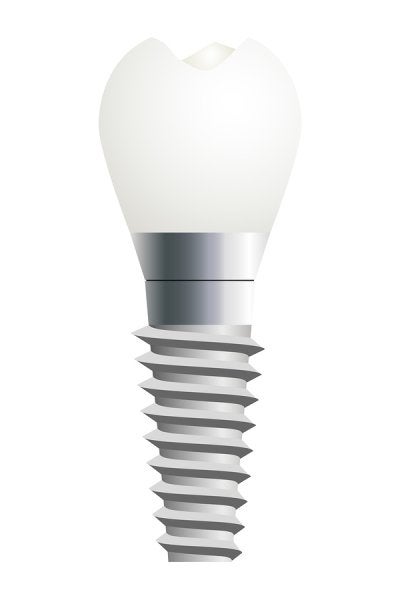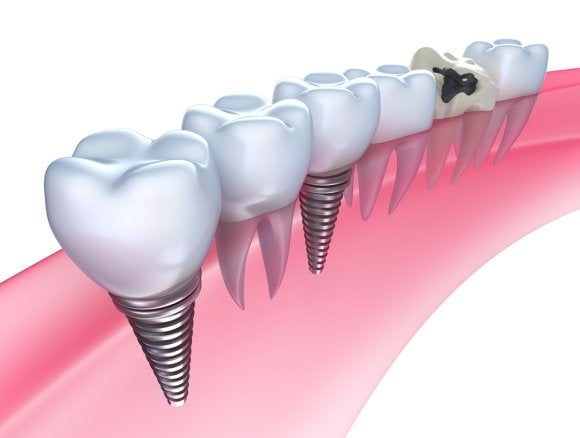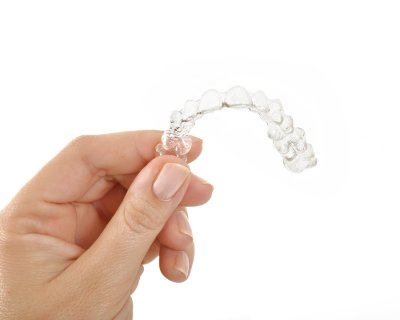-
The Benefits of Dental Implants
When you have missing teeth, it’s important to discuss your tooth replacement options with your dentist. Leaving a gap where you’ve lost a tooth can have serious repercussions for your long-term dental health, including deterioration of bone and damage to remaining teeth. Dentures and bridges used to be the only alternatives for replacing missing teeth, but now dentists are turning to dental implants more and more for better results and greater patient comfort. Talk to your Glenview dentist about whether implants are the right choice for you, and as you weigh your options, keep these benefits in mind.

No Slippage
One of the biggest issues faced by denture wearers is the way dentures can slip around in the mouth. In addition to impacting your self-esteem—making you constantly concerned that people will see your dentures moving—slippage can irritate your gums and affect how you eat and speak. With dental implants , there’s no risk of slippage. The implants are anchored in your jaw with artificial tooth roots, so they stay in place just like your natural teeth.No Damage to Neighboring Teeth
When you have natural teeth remaining, instead of a full denture, your dentist can replace the missing teeth with a bridge. The trouble with a bridge is that it relies on your natural teeth for support. Over time, the bridge can weaken those teeth, cause toothache, and even deteriorate teeth to the point that extraction is required, necessitating another bridge. Dental implants are supported by artificial roots that fuse with your jaw, not any other teeth. None of your remaining teeth are damaged by dental implants.No Special Care
Dental implants look like natural teeth, and you can care for them the same way. Simply brush, floss, and have regular check-ups with your dentist, and your implant should last indefinitely. Dentures require special cleaning daily, and over time, as your mouth changes, you may need adjustments to your dentures so they continue to fit. -
Why You Should Decide on Dental Implants [INFOGRAPHIC]
Missing teeth are bad news for your dental health. When you’ve lost teeth, you leave your gums vulnerable to irritation and your remaining teeth at risk for shifting and falling out. While dentures and bridges used to be the only options for people with tooth loss, a newer solution is becoming the gold standard for tooth replacement: dental implants. With dental implants, you don’t have to worry about many of the problems that accompany dentures, like special care requirements and slippage that causes speech and eating difficulties. Dental implants look and act like your natural teeth, and they don’t require special attention. No one will know you’ve got an implant except you and your Glenview dentist . Learn more about dental implants in this infographic from DentiStar. If you have friends and family members who are dealing with tooth loss, share this information with them so they can talk to their own family dental care providers about their treatment options.

-
How to Care for Your Dental Implants
Dental implants have many advantages, but one of their biggest boons is that they do not require the same kind of special care as dentures and bridges. With minimal attention, dental implants can last a lifetime. Having regular check-ups with your Glenview dentist is an important part of dental implant maintenance. Here is what else you need to know.
Dental implants are rooted in your jaw and don’t rely on natural teeth for support. They look and feel just like your natural teeth—no one will know you have a dental implant but you. You can also care for them as you would your natural teeth. Brush and floss your dental implant as you do your other teeth, and you will be able to keep it clean and healthy. Although dental implants can’t get cavities, you can get gum disease around the implant, so have regular cleanings and checks-ups to keep gum issues at bay. This easy care routine will make your dental implants last indefinitely.

-
Is Invisalign Right for You?
If your orthodontist has told you that you need treatment for tooth misalignment, then you have a choice: braces or Invisalign. There are pros and cons to each type of orthodontic treatment, but many patients find that Invisalign gives them both the convenience and results they want. Make an appointment with a Glenview orthodontist to discuss your treatment options. As you explore your choices, consider the following signs that Invisalign could be the right fit for you.

You Have Cosmetic Concerns about Braces
What many people dread the most about getting braces is the metal brackets and wires. This is especially true for adult patients getting orthodontic care who are hesitant about the effect wearing braces could have on their professional lives. Invisalign is the perfect solution. Because the aligners are clear, no one will know that you are wearing them but you.You Don’t Want to Change Your Eating Habits
When you get braces, your orthodontist will give you a long list of foods that are off-limits during treatment, including things like popcorn, gum, and apples. With Invisalign, you don’t have to change the way you eat at all. You remove the aligners every time you eat, so you can have anything you like without worrying about breaking a bracket or getting a piece of food stuck under a wire.You Want to Brush and Floss Normally
Another thing your orthodontist will teach you when you get braces is how to brush and floss around the brackets and wires. Invisalign patients don’t have these issues. They pop out their aligners and follow their usual oral hygiene routines, without the need for special tools like floss threaders and proxabrushes. As a result, people with Invisalign tend to have fewer dental health issues during treatment than those with braces, who often struggle to effectively keep their teeth clean.
